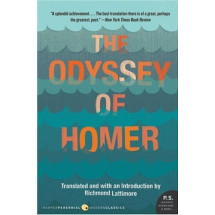Caustic and hilarious, Candide has ranked as one of the world's great satires since its first publication in 1759. It concerns the adventures of the youthful Candide, disciple of Dr. Pangloss, who was himself a disciple of Leibniz.In the course of his travels and adventures in Europe and South America, Candide saw and suffered such misfortune that it was difficult for him to believe this was "the best of all possible worlds" as Dr. Pangloss had assured him. Indeed, it seemed to be quite the opposite. In brilliantly skewering such na?et? Voltaire mercilessly exposes and satirizes romance, science, philosophy, religion and government-the ideas and forces that permeate and control the lives of men.
After many trials and travails, Candide is reunited with Cunegonde, his sweetheart. He then buys a little farm in Turkey where he and Cunegonde, Dr. Pangloss and others all retire. In the end, Candide decides that the best thing in the world is to cultivate one's own garden
Witty and caustic, Candide has ranked as one of the world's great satires since its first publication in 1759. In the story of the trials and travails of the youthful Candide, his mentor Dr. Pangloss, and a host of other characters, Voltaire mercilessly satirizes and exposes romance, science, philosophy, religion, and government.
Voltaire (1694-1778) French writer, satirist, the embodiment of the 18th-century Enlightenment. Among his best-known works is the satirical short story CANDIDE (1759).
Michael Wood (introducer) is currently Straut Professor of English at Princeton. His books include Stendhal, America in the Movies, The Magician's Doubts, Franz Kafka, and The Road to Delphi. Theo Cuffe (translator) has also translated a selection of Voltaire's short stories for Penguin, Microm gas and Other Short Fictions.
--This text refers to an alternate Paperback edition.
Franois-Marie Arouet, writing under the pseudonym Voltaire, was born in 1694 into a Parisian bourgeois family. Educated by Jesuits, he was an excellent pupil but one quickly enraged by dogma. An early rift with his fatherho wished him to study lawed to his choice of letters as a career. Insinuating himself into court circles, he became notorious for lampoons on leading notables and was twice imprisoned in the Bastille.
By his mid-thirties his literary activities precipitated a four-year exile in England where he won the praise of Swift and Pope for his political tracts. His publication, three years later in France, of Lettres philosophiques sur les Anglais (1733)n attack on French Church and Stateorced him to flee again. For twenty years Voltaire lived chiefly away from Paris. In this, his most prolific period, he wrote such satirical tales as Zadig (1747) and Candide(1759). His old age at Ferney, outside Geneva, was made bright by his adopted daughter, elle et Bonne, and marked by his intercessions in behalf of victims of political injustice. Sharp-witted and lean in his white wig, impatient with all appropriate rituals, he died in Paris in 1778he foremost French author of his day.
Theo Cuffe translated Voltaire Micromgas and Other Short Fictions for Penguin Classics
--This text refers to an alternate Paperback edition.














